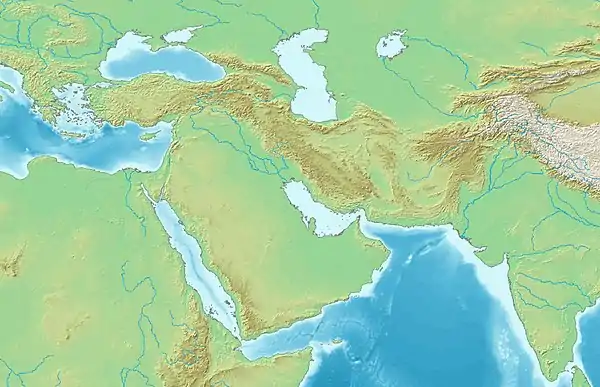
Khwarazm oasis
Location of the Khwarazm oasis in Western Asia.
Artav (’rt’w “the just”, also spelled Artabanus)[3] was a Khwarazmian king who ruled the Khwarazm region of Central Asia in the second half of the 2nd-century. He was the second king of an unnamed kingdom in Khwarazm, founded by his predecessor, whose name is unknown. Artav, during his reign, started the construction of the city of Toprak-Kala, which became his capital.[4]
Some of his coins were found in his capital city of Toprak-Kala, together with coins of the Kushan Empire rulers Vima Kadphises and Kanishka.[5]
References
- ↑ Whitehead, R. B. (1947). "Notes on the Indo-Greeks: Part Ii" (PDF). The Numismatic Chronicle and Journal of the Royal Numismatic Society. 7 (1/2): 38, fig.3. ISSN 0267-7504. JSTOR 42663141.
- ↑ Vainberg, B. I. ""Chorasmian coinage" in Encyclopaedia Iranica". iranicaonline.org.
- ↑ "CHORASMIA i. Archeology and pre-Islamic hist. – Encyclopaedia Iranica". iranicaonline.org.
- ↑ "The second king of the dynasty was Artav ('ri'w "the just"; Vainberg, 1977, p. 52). He appears to have begun construction of a new capital, the ruins of which were discovered by Tolstov in 1938 at Toprak - kala"Yar-Shater, Ehsan (1982). Encyclopaedia Iranica. Routledge & Kegan Paul. p. 514. ISBN 9780710090904.
- ↑ "Apart from purely archaeological and artistic evidence, the date has been determined from coins of the Kushan kings Vima Kadphises and Kanishka, and of the Khwarazmian king Artav, that were found on the lower floors of some structures . Some economic documents found in the Palace were dated to between 188 and 252 of the Khwarazmian era, i.e., to within the third century A.D. It should be borne in mind that only an insignificant portion of the archive has survived." in "Bulletin of the Asia Institute". Wayne State University Press. 1996: 183.
{{cite journal}}: Cite journal requires|journal=(help)
Sources
- Bosworth, Yuri Aleksandrovich (1991). "CHORASMIA i. Archeology and pre-Islamic history". Encyclopaedia Iranica, Vol. V, Fasc. 5. C. Edmund Bosworth. pp. 511–516.
- Fedorov, Michael; Kuznetsov, Andrew (2011). "On some previously unknown Khwarazmian drachms and the names of rulers on them". Iran. Taylor & Francis, Ltd. 49: 79–88. doi:10.1080/05786967.2011.11834430. JSTOR 41431230. S2CID 192405406.
This article is issued from Wikipedia. The text is licensed under Creative Commons - Attribution - Sharealike. Additional terms may apply for the media files.
.jpg.webp)